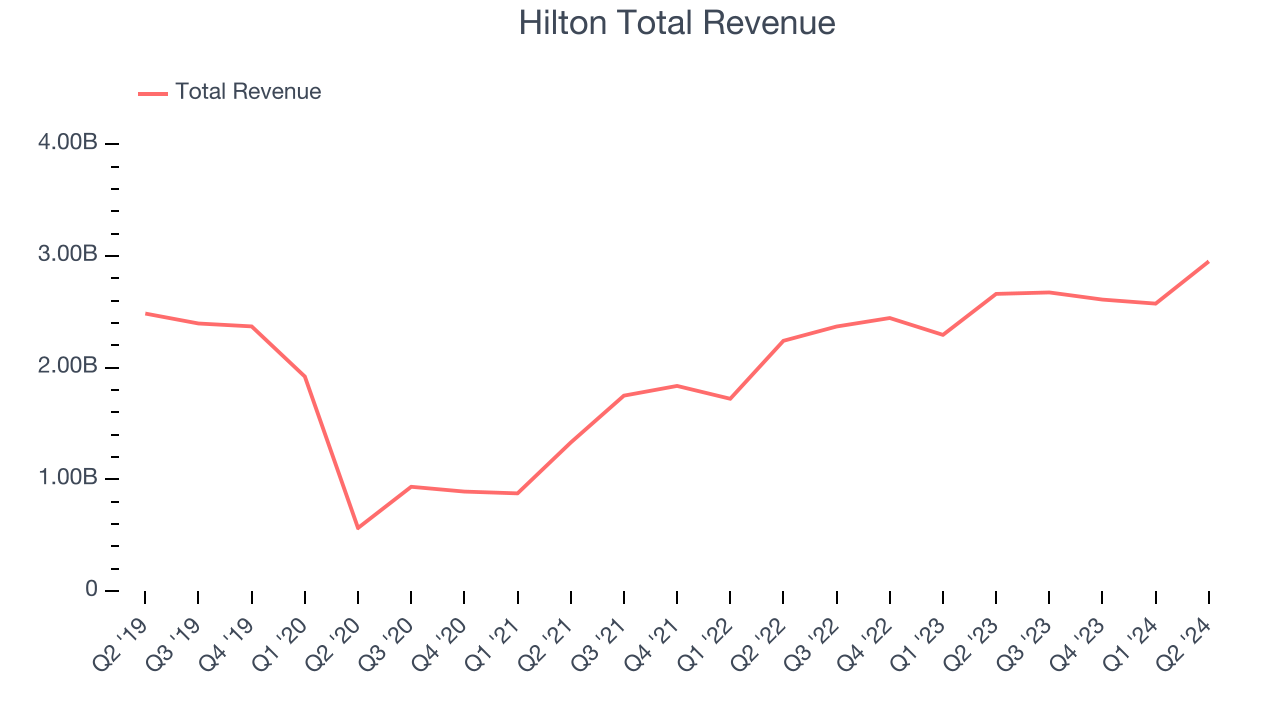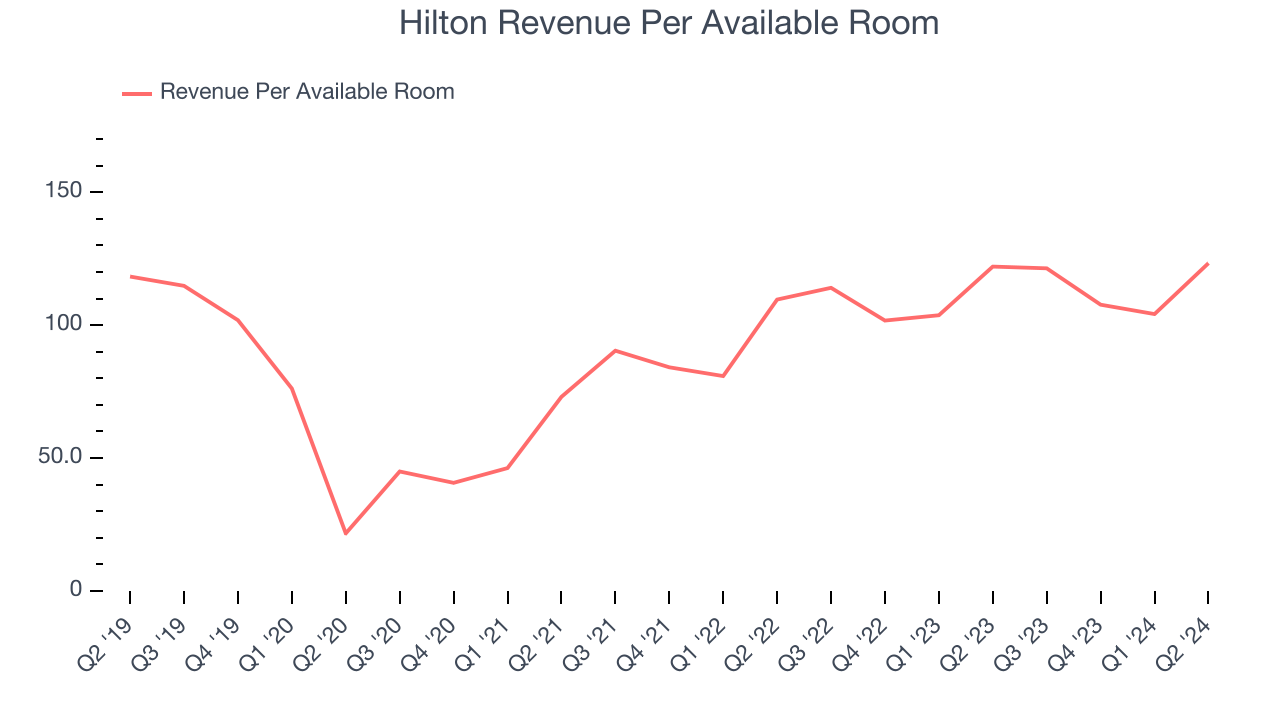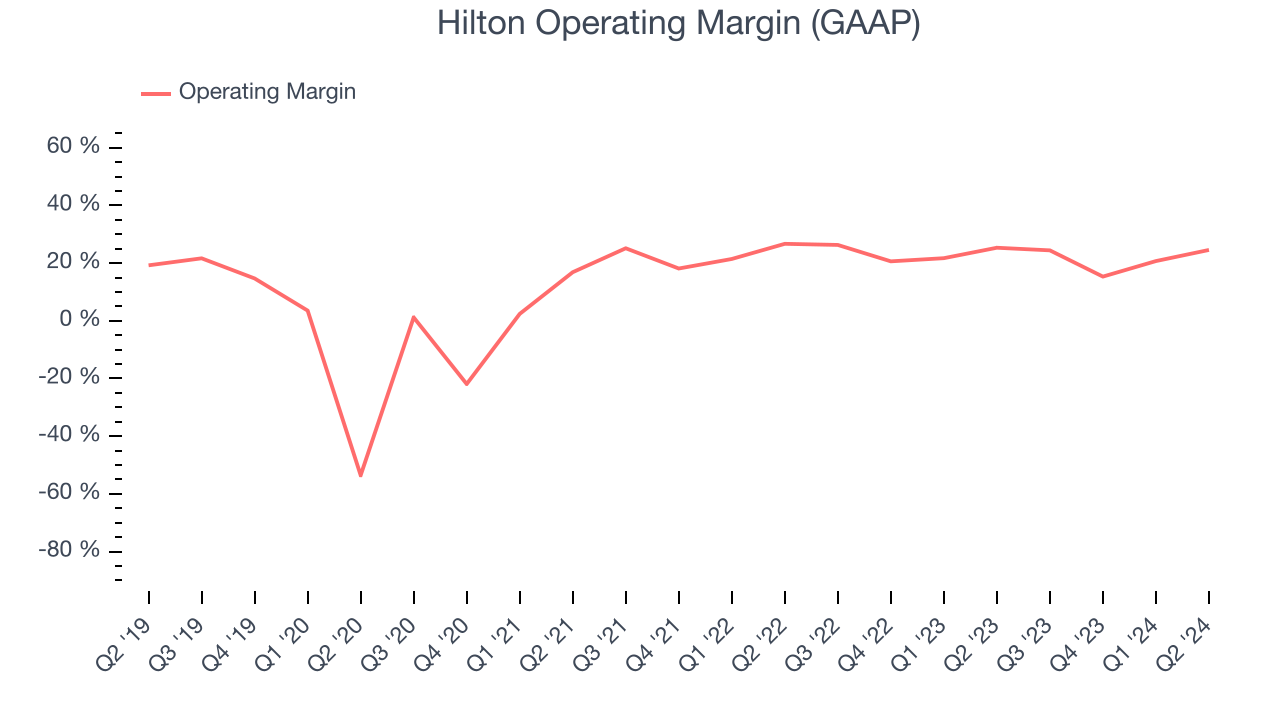Hotel company Hilton (NYSE:HLT) reported results in line with analysts' expectations in Q2 CY2024, with revenue up 10.9% year on year to $2.95 billion. It made a non-GAAP profit of $1.91 per share, improving from its profit of $1.55 per share in the same quarter last year.
Is now the time to buy Hilton? Find out in our full research report.
Hilton (HLT) Q2 CY2024 Highlights:
- Revenue: $2.95 billion vs analyst estimates of $2.94 billion (small beat)
- EPS (non-GAAP): $1.91 vs analyst estimates of $1.86 (2.6% beat)
- EPS (non-GAAP) guidance for Q3 CY2024 is $1.83 at the midpoint, below analyst estimates of $1.90
- EPS (non-GAAP) guidance for the full year is $6.98 at the midpoint, missing analyst estimates by 1.7%
- Gross Margin (GAAP): 89.9%, up from 88.8% in the same quarter last year
- Adjusted EBITDA Margin: 31.1%, in line with the same quarter last year
- RevPAR: $123.30 at quarter end, up 1% year on year
- Market Capitalization: $51.79 billion
Christopher J. Nassetta, President & Chief Executive Officer of Hilton, said, "We are pleased to report a solid second quarter, with an increase in RevPAR of 3.5%, driven by growth in all segments, with particularly strong group performance. On the development side, we ended the quarter with a record development pipeline, up 15% from the prior year and up 8% sequentially from the first quarter, including strategic partner hotels. Looking forward to the rest of the year, with the continued growth of our existing brands, as well as the addition of our new brands and strategic partner hotels, we expect net unit growth of 7.0 percent to 7.5 percent for the full year. "
Founded in 1919, Hilton Worldwide (NYSE:HLT) is a global hospitality company with a portfolio of hotel brands.
Hotels, Resorts and Cruise Lines
Hotels, resorts, and cruise line companies often sell experiences rather than tangible products, and in the last decade-plus, consumers have slowly shifted from buying "things" (wasteful) to buying "experiences" (memorable). In addition, the internet has introduced new ways of approaching leisure and lodging such as booking homes and longer-term accommodations. Traditional hotel, resorts, and cruise line companies must innovate to stay relevant in a market rife with innovation.
Sales Growth
Reviewing a company's long-term performance can reveal insights into its business quality. Any business can have short-term success, but a top-tier one tends to sustain growth for years. Over the last five years, Hilton grew its sales at a weak 3.2% compounded annual growth rate. This shows it failed to expand in any major way and is a rough starting point for our analysis. 
We at StockStory place the most emphasis on long-term growth, but within consumer discretionary, a stretched historical view may miss a company riding a successful new property or emerging trend. Hilton's annualized revenue growth of 19.7% over the last two years is above its five-year trend, suggesting its demand recently accelerated. Note that COVID hurt Hilton's business in 2020 and part of 2021, and it bounced back in a big way thereafter.
We can dig further into the company's revenue dynamics by analyzing its revenue per available room, which clocked in at $123.30 this quarter and is a key metric accounting for daily rates and occupancy levels. Over the last two years, Hilton's revenue per room averaged 12.6% year-on-year growth. Because this number is lower than its revenue growth, we can see its sales from other areas like restaurants, bars, and amenities outperformed its room bookings. 
This quarter, Hilton's year-on-year revenue growth clocked in at 10.9%, and its $2.95 billion of revenue was line with Wall Street's estimates. Looking ahead, Wall Street expects sales to grow 9.3% over the next 12 months, a deceleration from this quarter.
Here at StockStory, we certainly understand the potential of thematic investing. Diverse winners from Microsoft (MSFT) to Alphabet (GOOG), Coca-Cola (KO) to Monster Beverage (MNST) could all have been identified as promising growth stories with a megatrend driving the growth. So, in that spirit, we’ve identified a relatively under-the-radar profitable growth stock benefitting from the rise of AI, available to you FREE via this link.
Operating Margin
Hilton's operating margin has shrunk over the last year, but it still averaged 22.4%, elite for a consumer discretionary business. This shows it's an optimally-run company with an efficient cost structure, and we wouldn't weigh the short-term trend too heavily.

This quarter, Hilton generated an operating profit margin of 24.6%, in line with the same quarter last year. This indicates the company's overall cost structure has been relatively stable.
Key Takeaways from Hilton's Q2 Results
We struggled to find many strong positives in these results. Its earnings forecast for next quarter was underwhelming and its full-year earnings guidance fell short of Wall Street's estimates. Overall, this was a mediocre quarter for Hilton. The stock traded down 1.2% to $204.50 immediately following the results.
So should you invest in Hilton right now? When making that decision, it's important to consider its valuation, business qualities, as well as what has happened in the latest quarter. We cover that in our actionable full research report which you can read here, it's free.
